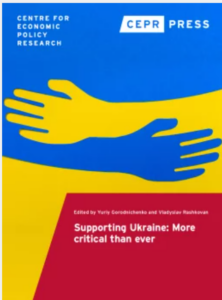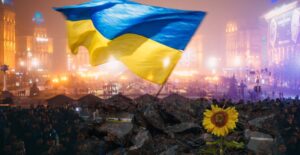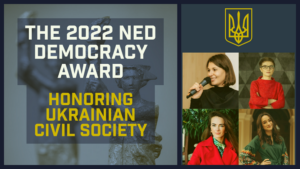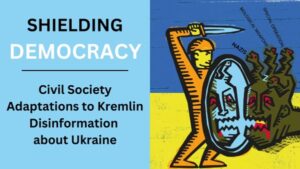A Russian victory in Ukraine would frog-march the world down a bleak path where might is right and frontiers are drawn by violence. It may hasten the next, even worse, confrontation in Europe. And it would deepen a widespread sense that Western power, and the universal values it sustains, are in steep decline, says The Economist.
Ukraine’s victory, by contrast, would bring hope that a sovereign democracy need not bow to its much larger, dictatorial neighbour. It would be a world that took heart from the resolve and courage of Mr Zelensky and the Ukrainian people, it adds.
A Russian victory would deepen a sense that Western power and universal values are in decline, says @TheEconomist. #Ukraine’s victory, by contrast, would bring hope that a sovereign democracy need not bow to its much larger, dictatorial neighbor, https://t.co/o4lHbfZlXU
— Democracy Digest (@demdigest) February 24, 2023
The war’s implications for Putin’s army, economy, society, and regime are many, and the costs will linger for years, if not decades, argues Stanford University’s Michael McFaul. Like Brezhnev did in Afghanistan, Putin overreached in Ukraine. His regime and his legacy will never recover, he writes for The Journal of Democracy:
- First, Putin has destroyed his military. … As Zoltan Barany notes, the “Russian military is a quintessential reflection of the state that created it: Autocratic, security-obsessed, and teeming with hyper-centralized decision-making, dysfunctional relations between civilian and military authorities, inefficiency, corruption, and brutality.” …
 Second, Putin’s invasion of Ukraine is producing long-term negative consequences for the Russian economy. ….Sanctions are already having an impact that will only continue to grow over time. Recent technology-export sanctions are exacting a heavy toll across the economy. Industries dependent on technology imports, such as car manufacturing, are suffering and will take years to recover. Without the necessary materials to make new automobiles, for example, Russian car sales dropped by 59 percent in 2022……
Second, Putin’s invasion of Ukraine is producing long-term negative consequences for the Russian economy. ….Sanctions are already having an impact that will only continue to grow over time. Recent technology-export sanctions are exacting a heavy toll across the economy. Industries dependent on technology imports, such as car manufacturing, are suffering and will take years to recover. Without the necessary materials to make new automobiles, for example, Russian car sales dropped by 59 percent in 2022……- Third, Putin’s dictatorship has become even more repressive and draconian since the invasion began. He expanded his oppressive foreign-agent legislation, so far declaring nearly five-hundred organizations and individuals to be extremists, terrorists, and criminals. ..
- Fourth, Putin’s war has produced lasting, negative changes in Russian society…Precisely measuring the negative economic impact of their exodus is hard. But surveys emphasize that nearly half of those who emigrated worked in IT and computing, as senior managers (16 percent), or in the arts and culture (16 percent)… This may be the worst and longest-lasting of all the damage to Russian society.
-

Credit: NDI
Fifth, Putin’s war in Ukraine has accelerated Russia’s political and economic isolation from the world, especially from Europe. …..In Russia’s neighborhood, every former Soviet republic, except for Belarus, now has either a more strained or more suspicious relationship with Russia than before…..
- Sixth and finally, there are even signs of cracks within Putin’s ruling elite. When you are losing the battle, the blame game begins. This is precisely what is happening in Russia today. RTWT
Civil society has been a priority in Ukraine since it declared independence from the Soviet Union in 1991, notes Tamar Jacoby, director of the New Ukraine Project at the Progressive Policy Institute and author of Displaced: The Ukrainian Refugee Experience. Most observers give Ukraine relatively high marks for the grassroots democracy that has emerged since—a bright spot in a country that has sometimes struggled with other aspects of democratic nation-building, including electoral politics and the battle against corruption, she writes for American Purpose.
But Ukraine “is not in good shape,” says Anti-Corruption Action Center co-founder and Executive Director Daria Kaleniuk. She tells MSNBC (above) how life has changed in Ukraine since the war began, one year ago. “Every single Ukrainian has someone, either a family member or a friend, who is fighting. A family member or a friend who was killed,” says Kaleniuk, a recipient of the NED’s 2022 Democracy Award.
 In a world where public opinion is heavily influenced by ignorance and bias, people routinely use crude information shortcuts to make political judgments. One such shortcut is the presumption that it’s good to be on winning side, notes Ilya Somin, Professor of Law at George Mason University:
In a world where public opinion is heavily influenced by ignorance and bias, people routinely use crude information shortcuts to make political judgments. One such shortcut is the presumption that it’s good to be on winning side, notes Ilya Somin, Professor of Law at George Mason University:
If adherents of an ideology prevail in a high-profile war, there must be something to their ideas! Such biases may be reinforced by the fallacious, but widespread assumptions that it’s necessarily good to be “on the right side of history” and that the “arc of the moral universe bends towards justice.” If so, one way of telling which side has a just cause is by looking to see who wins!
Given this dynamic, a decisive Ukrainian victory is likely to give a strong boost to liberal ideology, while a Russian one would boost authoritarian nationalism, he writes for Reason. Before the war, some Western commentators liked to contrast Russia’s supposedly manly army with the allegedly “woke” and “emasculated” US military, he adds:
 It doesn’t follow that pursuing military victory is the exclusive means of winning the war of ideas against Putin’s nationalist authoritarianism…..But Ukraine’s impressive battlefield performance so far suggests that it might achieve further success. And the ideological and moral dimensions of the conflict at least strengthen the case for pushing for a more sweeping Ukrainian victory than we might want to pursue otherwise.
It doesn’t follow that pursuing military victory is the exclusive means of winning the war of ideas against Putin’s nationalist authoritarianism…..But Ukraine’s impressive battlefield performance so far suggests that it might achieve further success. And the ideological and moral dimensions of the conflict at least strengthen the case for pushing for a more sweeping Ukrainian victory than we might want to pursue otherwise.
In an era when regimes the world over are repressing civil society and popular support for democracy is low in many countries, Ukraine has offered lessons in how to support and reinforce universal human rights without diminishing national loyalty, to organize leaderless movements that succeed, and to renew and grow civil society even under the most strenuous circumstances, the National Democratic Institute’s Lauren Van Metre writes for Just Security.
 “One Year Later: Russia’s War Against Ukraine.” The United States Institute of Peace hosts a discussion with former U.S. Ambassador to Ukraine Marie “Masha” Yovanovitch, senior adviser at the USIP Russia and Europe Center; Mary Glantz, senior adviser at the USIP Russia and Europe Center and former State Department fellow; and Maria Snegovaya, former NED Penn Kemble fellow, senior fellow for Russia and Eurasia at the Center for Strategic and International Studies.
“One Year Later: Russia’s War Against Ukraine.” The United States Institute of Peace hosts a discussion with former U.S. Ambassador to Ukraine Marie “Masha” Yovanovitch, senior adviser at the USIP Russia and Europe Center; Mary Glantz, senior adviser at the USIP Russia and Europe Center and former State Department fellow; and Maria Snegovaya, former NED Penn Kemble fellow, senior fellow for Russia and Eurasia at the Center for Strategic and International Studies.
10 a.m. March 1, 2023. Venue: USIP, 2301 Constitution Avenue NW, Washington, D.C. RSVP







